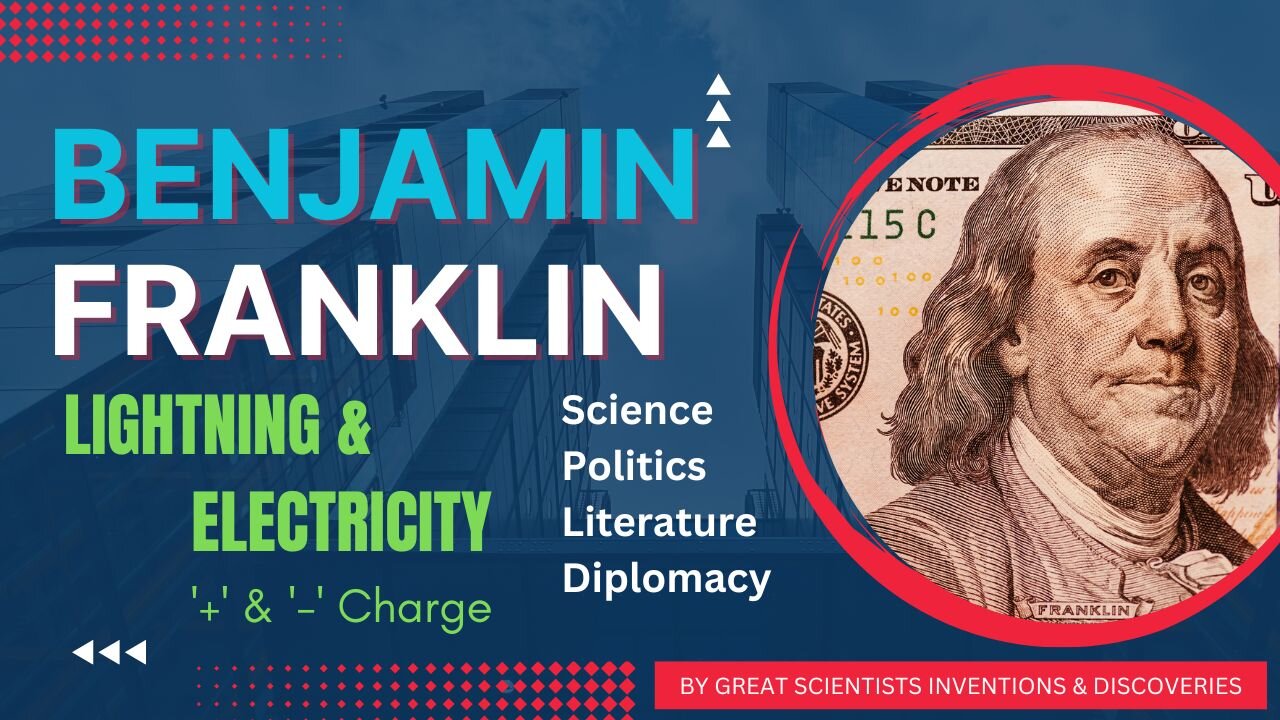Premium Only Content

BENJAMIN FRANKLIN - LIGHTNING & ELECTRICITY, + & - Charges
Benjamin Franklin (January 17, 1706 – April 17, 1790) was a polymath, a Founding Father of the United States, and a key figure in American history. He made significant contributions in various fields, including science, politics, diplomacy, writing, and invention. Here are some key aspects of his life and accomplishments:
Inventor and Scientist: Franklin is known for his experiments with electricity. He conducted the famous kite experiment to demonstrate the connection between lightning and electricity. He coined the terms "positive" and "negative" charge and introduced the concept of electric grounding. His work laid the foundation for understanding electricity and led to inventions such as the lightning rod, which protects buildings from lightning strikes.
Writer and Publisher: Franklin was an accomplished writer and publisher. He authored the popular almanac "Poor Richard's Almanack," which contained witty and practical advice. His aphorisms, like "Early to bed and early to rise, makes a man healthy, wealthy, and wise," became well-known. He also published newspapers and essays, contributing to the spread of Enlightenment ideas.
Diplomat and Statesman: Franklin played a crucial role in the American Revolution and the creation of the United States. He served as a diplomat in Europe, representing the American colonies and securing critical alliances with countries like France. He helped negotiate the Treaty of Paris in 1783, which ended the Revolutionary War and established American independence.
Founding Father: Franklin was one of the Founding Fathers who helped draft important documents like the Declaration of Independence (1776) and the United States Constitution (1787). His experience, wisdom, and compromise skills were vital during the Constitutional Convention.
Civic Leader: Franklin was involved in various civic organizations. He co-founded the first American fire insurance company, established the first public library in Philadelphia, and played a role in founding the University of Pennsylvania.
Philosopher and Thinker: Franklin was influenced by Enlightenment philosophy and believed in the power of reason, education, and scientific inquiry. His belief in the value of practical knowledge and self-improvement was evident in his writings and actions.
Abolition and Advocacy: Later in life, Franklin became an advocate for the abolition of slavery and expressed his views through writings and actions. He served as the president of the Pennsylvania Society for Promoting the Abolition of Slavery.
Benjamin Franklin's legacy is felt in various aspects of modern society, from his contributions to science and invention to his impact on American democracy and values. His multifaceted accomplishments have left an indelible mark on history and continue to inspire generations of thinkers, inventors, and leaders.
-
 LIVE
LIVE
Sean Unpaved
24 minutes agoCincinnati's Sack King Stays: Decoding the Deal & the NFL's Open-Ended Questions
213 watching -
 1:57:04
1:57:04
Steven Crowder
3 hours agoAdios & Ni Hao: Trump Sends Abrego Garcia to Africa But Welcomes 600K Chinese to America
187K138 -
 LIVE
LIVE
The White House
3 hours agoPresident Trump Participates in a Cabinet Meeting, Aug. 26, 2025
2,911 watching -
 LIVE
LIVE
Rebel News
26 minutes agoCarney's flawed LNG deal, Libs keep mass immigration, Poilievre's plan to fix it | Rebel Roundup
119 watching -
 LIVE
LIVE
Side Scrollers Podcast
2 hours agoINSANE Illegal Migrant Propaganda Xbox Game + Paypal REFUSES To Pay Dev + More | Side Scrollers
250 watching -
 27:39
27:39
Crypto.com
3 hours ago2025 Live AMA with Kris Marszalek, Co-Founder & CEO of Crypto.com
39.7K3 -
 LIVE
LIVE
TheAlecLaceShow
55 minutes agoMAGA Pushback Against Flag Burning EO & 600K Chinese Students | Cashless Bail | The Alec Lace Show
59 watching -
 1:09:18
1:09:18
SGT Report
15 hours agoBIOHACKING 101: MAKING BIG PHARMA IRRELEVANT -- Dr. Diane Kazer
21.5K18 -
 LIVE
LIVE
JuicyJohns
4 hours ago $1.35 earned🟢#1 REBIRTH PLAYER 10.2+ KD🟢
112 watching -
 LIVE
LIVE
The Mel K Show
1 hour agoMORNINGS WITH MEL K - The Future of the Constitutional Republic: Local Action for National Impact 8-26-25
719 watching